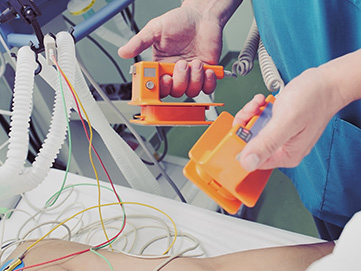General Overview
 Cardioversion is a procedure to restore a regular rhythm of your heart beat. There are various causes which lead to an abnormal heart rhythm, better known as arrhythmias. In Cardioversion, the abnormality in heart rhythm is treated by using electricity or drugs.
Usually electricity is preferred by the physicians to return patients to a normal heart rate.
Cardioversion is a procedure to restore a regular rhythm of your heart beat. There are various causes which lead to an abnormal heart rhythm, better known as arrhythmias. In Cardioversion, the abnormality in heart rhythm is treated by using electricity or drugs.
Usually electricity is preferred by the physicians to return patients to a normal heart rate.
How It’s Done
The procedure is performed either after sedation or under anesthesia. During Cardioversion, the physician delivers an electric shock through two paddles. The paddles are placed on the chest of the patient and the shock lasts for less than a second. After the shock, the doctor checks the heart rhythm and whether it has become normal. In some cases, only one shock is sufficient to regain the normal heart rate but others may require a few more until the heart beat rhythm restores to normal.What Methods are Used?
Two types of Cardioversion are used to restore the heart rhythm back to normal.1. E-electrical Cardioversion defibrillation are the most common procedure to cure patients suffering from cardiac arrhythmias.
2. Chemical Cardioversion using drugs – This method is occasionally used for those who face occasional atrial fibrillation.certain types of arrhythmias.
Any Side Effects?
Cardioversion treatment may cause rare side-effects (but are not limited to):Blood clots: Some people have blood clots in their hearts which may dislocate and spread to other parts when an electric shock is given. This risk is reduced by giving blood thinners for a few weeks prior to the procedure or checking for blood clot by a special procedure called trans-esophageal echocardiogram.
Low blood pressure: This is not uncommon and usually improves.
Skin burns: In some cases, minor burns may occur on the site where electrodes were placed. Follow-up treatments or next steps: A healthy heart requires a healthy lifestyle. The doctor suggests the following after-care methods for patients who undergo Cardioversion: Increased physical exercise to stay healthy and fit.
- Use less sodium in diet to avoid high blood pressure chances.
- Avoid caffeine dosage.
- Quit smoking.
- Keep the cholesterol and blood pressure levels under control.
Contact Us
Heart and Vascular Clinic, located in Newark, Wilmington, and Middletown, Delaware, provides the latest techniques of treating cardiac problems. Please contact us at (302) 338-9444 for detailed information of our services and avail the best of our experts’ opinions for better results.
